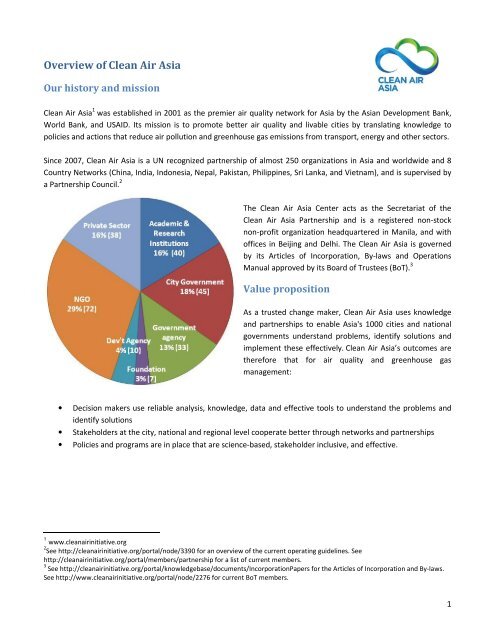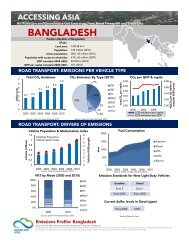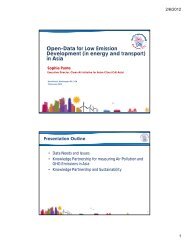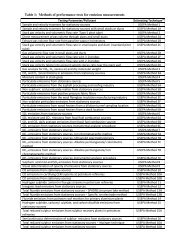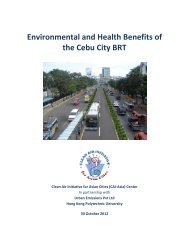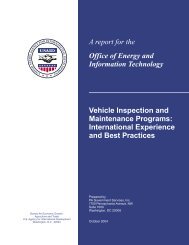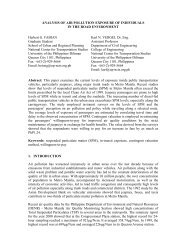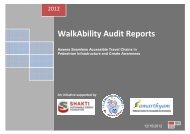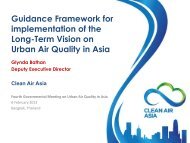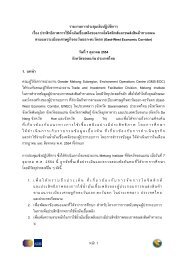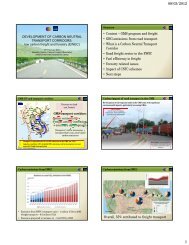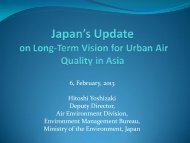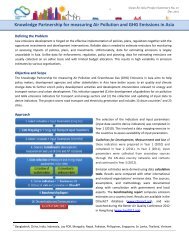Overview of Clean Air Asia - Clean Air Initiative
Overview of Clean Air Asia - Clean Air Initiative
Overview of Clean Air Asia - Clean Air Initiative
Create successful ePaper yourself
Turn your PDF publications into a flip-book with our unique Google optimized e-Paper software.
<strong>Overview</strong> <strong>of</strong> <strong>Clean</strong> <strong>Air</strong> <strong>Asia</strong><br />
Our history and mission<br />
<strong>Clean</strong> <strong>Air</strong> <strong>Asia</strong> 1 was established in 2001 as the premier air quality network for <strong>Asia</strong> by the <strong>Asia</strong>n Development Bank,<br />
World Bank, and USAID. Its mission is to promote better air quality and livable cities by translating knowledge to<br />
policies and actions that reduce air pollution and greenhouse gas emissions from transport, energy and other sectors.<br />
Since 2007, <strong>Clean</strong> <strong>Air</strong> <strong>Asia</strong> is a UN recognized partnership <strong>of</strong> almost 250 organizations in <strong>Asia</strong> and worldwide and 8<br />
Country Networks (China, India, Indonesia, Nepal, Pakistan, Philippines, Sri Lanka, and Vietnam), and is supervised by<br />
a Partnership Council. 2<br />
The <strong>Clean</strong> <strong>Air</strong> <strong>Asia</strong> Center acts as the Secretariat <strong>of</strong> the<br />
<strong>Clean</strong> <strong>Air</strong> <strong>Asia</strong> Partnership and is a registered non-stock<br />
non-pr<strong>of</strong>it organization headquartered in Manila, and with<br />
<strong>of</strong>fices in Beijing and Delhi. The <strong>Clean</strong> <strong>Air</strong> <strong>Asia</strong> is governed<br />
by its Articles <strong>of</strong> Incorporation, By-laws and Operations<br />
Manual approved by its Board <strong>of</strong> Trustees (BoT). 3<br />
Value proposition<br />
As a trusted change maker, <strong>Clean</strong> <strong>Air</strong> <strong>Asia</strong> uses knowledge<br />
and partnerships to enable <strong>Asia</strong>'s 1000 cities and national<br />
governments understand problems, identify solutions and<br />
implement these effectively. <strong>Clean</strong> <strong>Air</strong> <strong>Asia</strong>’s outcomes are<br />
therefore that for air quality and greenhouse gas<br />
management:<br />
• Decision makers use reliable analysis, knowledge, data and effective tools to understand the problems and<br />
identify solutions<br />
• Stakeholders at the city, national and regional level cooperate better through networks and partnerships<br />
• Policies and programs are in place that are science-based, stakeholder inclusive, and effective.<br />
1 www.cleanairinitiative.org<br />
2 See http://cleanairinitiative.org/portal/node/3390 for an overview <strong>of</strong> the current operating guidelines. See<br />
http://cleanairinitiative.org/portal/members/partnership for a list <strong>of</strong> current members.<br />
3 See http://cleanairinitiative.org/portal/knowledgebase/documents/IncorporationPapers for the Articles <strong>of</strong> Incorporation and By-laws.<br />
See http://www.cleanairinitiative.org/portal/node/2276 for current BoT members.<br />
1
What we aim for<br />
Reduced air pollution<br />
and greenhouse gas<br />
emissions<br />
Improved health<br />
Energy savings<br />
Livable cities<br />
Outcomes<br />
<strong>Clean</strong> <strong>Air</strong> <strong>Asia</strong> as a trusted<br />
CHANGE MAKER<br />
• Decision makers use reliable<br />
analysis, knowledge, data and<br />
effective tools to understand<br />
the problems and identify<br />
solutions<br />
• Stakeholders at the city,<br />
national and regional level<br />
cooperate better through<br />
networks & partnerships<br />
Strategy, Business Plan and Programs<br />
• Policies and programs are in<br />
place that are science-based,<br />
stakeholder inclusive, and<br />
effective<br />
<strong>Clean</strong> <strong>Air</strong> <strong>Asia</strong> Programs<br />
<strong>Air</strong> Quality and<br />
Climate Change<br />
Low Emissions<br />
Urban<br />
Development<br />
<strong>Clean</strong> Fuels<br />
and Vehicles<br />
Green<br />
Freight and<br />
Logistics<br />
Input from <strong>Clean</strong> <strong>Air</strong> <strong>Asia</strong><br />
Partnership and other partners<br />
<strong>Clean</strong> <strong>Air</strong> <strong>Asia</strong> has a four-year strategy 2013-2016 that details <strong>Clean</strong> <strong>Air</strong> <strong>Asia</strong>’s value proposition and outcomes, the<br />
goals for <strong>Asia</strong> under each <strong>of</strong> the four programs and the role that <strong>Clean</strong> <strong>Air</strong> <strong>Asia</strong> plays in achieving these. 4 These<br />
programs are: <strong>Air</strong> Quality & Climate Change, Low Emissions Urban Development, <strong>Clean</strong> Fuels and Vehicles, and Green<br />
Freight and Logistics. In addition, <strong>Clean</strong> <strong>Air</strong> <strong>Asia</strong> organizes the Better <strong>Air</strong> Quality conference every two years since<br />
2002 and is <strong>Asia</strong>’s leading conference on the topic <strong>of</strong> air quality, climate change, transport, energy and cities,bringing<br />
together more than 600 practitioners, policy makers and the private sector. 5<br />
The <strong>Clean</strong> <strong>Air</strong> <strong>Asia</strong> Center has a two-year Business Plan 2013-2014 to implement this strategy. It describes the<br />
Business Model <strong>of</strong> the <strong>Clean</strong> <strong>Air</strong> <strong>Asia</strong> Center supported by organizational objectives based on the Balanced<br />
Scorecard: 6<br />
• Customer: Visibly contribute to achieving the <strong>Clean</strong> <strong>Air</strong> <strong>Asia</strong>’s outcomes to in turn contribute to the <strong>Asia</strong> goals<br />
for the four program areas<br />
• Financial: Ensure medium-term financial sustainability by securing sufficient funds to cover core expenses<br />
and costs <strong>of</strong> expanding activities.<br />
• Internal Business Processes: Run operations efficiently and effectively through continued improvement <strong>of</strong><br />
organizational management, financial and administrative systems, and program/project management.<br />
• Learning and Growth: Enhance the ability to attract, develop and retain capable and confident staff at the<br />
<strong>Clean</strong> <strong>Air</strong> <strong>Asia</strong> and at Country Networks.<br />
Progress is reported to the Board <strong>of</strong> Trustees <strong>of</strong> the <strong>Clean</strong> <strong>Air</strong> <strong>Asia</strong> Center every quarter, and to the <strong>Clean</strong> <strong>Air</strong> <strong>Asia</strong><br />
Partnership Council and public each year through its Annual Report. 4<br />
4 See http://cleanairinitiative.org/portal/sites/default/files/documents/CLEAN_AIR_ASIA_2012_-_Ten_Year_Milestone_Report.pdf for 10<br />
Years <strong>Clean</strong> <strong>Air</strong> <strong>Asia</strong>, which details the <strong>Clean</strong> <strong>Air</strong> <strong>Asia</strong> Strategy 2013-2016 and also serves as the 2011 Annual Report.<br />
5 www.baqconference.org<br />
6 http://www.balancedscorecard.org/BSCResources/AbouttheBalancedScorecard/tabid/55/Default.aspx<br />
2
<strong>Clean</strong> <strong>Air</strong> <strong>Asia</strong> Strategy Summary<br />
Mission To promote better air quality and livable cities by translating knowledge to policies and actions that reduce air pollution and greenhouse gas emissions from<br />
transport, energy and other sectors.<br />
Outcomes • Decision makers use reliable analysis, knowledge, data and effective tools to understand the problems and identify feasible solutions<br />
• Stakeholders at the city, national and regional level cooperate better through successful networks and partnerships<br />
• Policies and programs are in place that are science-based, stakeholder inclusive, and effective<br />
Program <strong>Air</strong> quality and Climate change Low emissions urban development <strong>Clean</strong> fuels and vehicles Green freight and logistics<br />
Goals for<br />
<strong>Asia</strong> 2016<br />
<strong>Clean</strong> <strong>Air</strong><br />
<strong>Asia</strong> role<br />
1. <strong>Asia</strong>n countries adopt National<br />
Ambient <strong>Air</strong> Quality Standards for<br />
PM10 and PM2.5 in line with WHO<br />
interim target 1 for daily and<br />
annual levels 7<br />
2. <strong>Asia</strong>n cities <strong>of</strong> more than 1 million<br />
people have air quality monitoring<br />
systems covering at least PM10,<br />
PM2.5, NO2 and SO2 and report<br />
data publicly every day<br />
3. <strong>Asia</strong>n cities <strong>of</strong> more than 1 million<br />
people have <strong>Clean</strong> <strong>Air</strong> Plans with<br />
progress reported in annual<br />
reports 8<br />
• Guidance Framework for Better <strong>Air</strong><br />
Quality in <strong>Asia</strong>n Cities<br />
• Regional system for knowledge<br />
management and capacity building<br />
on air quality and GHG<br />
management (includes BAQ<br />
conferences)<br />
• Support cities on air pollution and<br />
GHG management<br />
1. <strong>Asia</strong>n countries adopt “avoid-shiftimprove”<br />
transport strategies that<br />
support low emissions urban<br />
development<br />
2. <strong>Asia</strong>n countries and cities <strong>of</strong> more<br />
than 1 million people issue regular<br />
reports on key air pollution and<br />
greenhouse gas emission indicators<br />
for transport and energy<br />
3. <strong>Asia</strong>n cities <strong>of</strong> more than 1 million<br />
maintain or improve the 2000-2010<br />
percentage share <strong>of</strong> personal trips<br />
by non-motorized and public<br />
transport<br />
• Mainstream low emissions<br />
transport strategies in policy and<br />
investment decisions<br />
• Knowledge management and<br />
exchange on land use, transport<br />
and energy<br />
• Bring walkability higher on the<br />
development agenda<br />
1. <strong>Asia</strong>n countries have Euro 4 or<br />
equivalent emission standards for<br />
light and heavy duty vehicles or have<br />
approved their introduction within<br />
four years<br />
2. <strong>Asia</strong>n countries have fuel economy<br />
standards for light and heavy duty<br />
vehicles or have approved their<br />
introduction within four years<br />
3. <strong>Asia</strong>n countries have effective<br />
programs for in-use vehicles including<br />
inspection and maintenance, phase<br />
out <strong>of</strong> polluting vehicles, and <strong>Clean</strong><br />
Fleet Management<br />
• Facilitate adoption <strong>of</strong> tighter<br />
standards for cleaner fuels and<br />
vehicles by <strong>Asia</strong>n countries<br />
• Strengthen policy frameworks for<br />
effective management <strong>of</strong> in-use<br />
vehicles<br />
• Introduce clean fleet management<br />
programs for public and private fleet<br />
operators<br />
1. <strong>Asia</strong>n countries have a national<br />
green freight initiative or are<br />
part <strong>of</strong> a similar multi-country<br />
initiative that actively engage<br />
government and the private<br />
sector<br />
2. <strong>Asia</strong>n countries and cities <strong>of</strong><br />
more than 1 million collect and<br />
regularly report key freight data.<br />
3. <strong>Clean</strong> truck technologies are<br />
available and demonstrated<br />
across <strong>Asia</strong>.<br />
• Establish regional and national<br />
green freight programs or<br />
initiatives<br />
• Mobilize a Green Freight <strong>Asia</strong><br />
Network <strong>of</strong> private sector<br />
companies and associations<br />
• Improve knowledge and data on<br />
road freight to inform policies,<br />
programs and initiatives<br />
7 150 and 70 ug/m 3 for PM10, and 75 and 35 ug/m 3 for PM2.5 respectively<br />
8 These plans have concrete goals to reduce air pollution and greenhouse gas emissions from transport, industry and other sources, supported by policies and measures with clear roles, timelines<br />
and resource allocation.<br />
3
Priority Activities 2013/2014<br />
For the next two years, the following are priority activities under each program.<br />
<strong>Air</strong> Quality & Climate Change Program<br />
The activities under this program are interlinked. The basis is the development <strong>of</strong> a clear Guidance Framework for<br />
Better <strong>Air</strong> Quality in <strong>Asia</strong>n Cities that gives detailed guidance for six key areas:<br />
• Setting and strengthening national ambient air quality standards (NAAQS) and improving air quality<br />
monitoring systems<br />
• Developing and updating emissions inventories, source apportionment, air quality modeling<br />
• Linking air quality levels and emissions data with health impacts and their social and economic cost (including<br />
the link with climate change)<br />
• Developing, implementing and evaluating the effectiveness <strong>of</strong> clean air plans, policies and measures<br />
(including co-benefits with climate change)<br />
• Communicating air quality, health and co-benefits information to government, other organizations and the<br />
public through <strong>Clean</strong> <strong>Air</strong> Reports, air quality indexes, Apps and other ways.<br />
• Governance, including compliance and enforcement, budgeting and financing and institutional frameworks.<br />
Early 2013, the 4 th Governmental Meeting was held to agree on an outline <strong>of</strong> the Guidance Framework, which sets<br />
the basis for writing the Guidance Framework until 2014. It also provides the basis for the regional system on<br />
knowledge management and capacity building. This is to be established in partnership with universities, research<br />
institutes, NGOs and others to support <strong>Asia</strong>n governments and cities in managing air pollution and GHG emissions,<br />
and develop publications “Improving AQM in <strong>Asia</strong>n cities”. In support <strong>of</strong> cities, <strong>Clean</strong> <strong>Air</strong> <strong>Asia</strong> will focus on an exclusive<br />
network <strong>of</strong> 25 <strong>Asia</strong>n cities in developing <strong>Asia</strong>n countries and peer cities in developed countries worldwide. Support<br />
includes city workshops, assessment <strong>of</strong> AQM areas and comparison with other cities; technical support in the form <strong>of</strong><br />
training, development <strong>of</strong> tools and analysis to improve priority AQM areas; and twinning <strong>of</strong> cities to facilitate learning.<br />
During the BAQ conference policy makers, practitioners, development agencies and the cities will come together, and<br />
a workshop <strong>of</strong> the entire city network on AQM will be organized as a pre-event to the BAQ.<br />
Low Emissions Urban Development Program<br />
The biggest opportunity for <strong>Clean</strong> <strong>Air</strong> <strong>Asia</strong> lies with the data on transport and energy and resulting air pollution and<br />
GHG indicators that are made publicly available through www.citiesact.org and the biannual “Accessing <strong>Asia</strong>”<br />
publication. Policy and investment decisions go hand in hand with the availability <strong>of</strong> tools and data. The essence <strong>of</strong><br />
this program is that we will continue to work with governments and cities on the policy side, especially on integrated<br />
“avoid-shift-improve” strategies into policy and investment decisions and in urban master plans. In parallel,<br />
improvements will be made to the Rapid Assessment <strong>of</strong> City Emissions (RACE) tool for transport and energy and on<br />
data quality and availability so that these will become more useful in policy making, city planning and investment<br />
decisions. Finally, to bring air quality and livable cities on the public and political agenda through walkability, <strong>Clean</strong><br />
<strong>Air</strong> <strong>Asia</strong> will continue work with city mayors to introduce Car Free Days, supplemented with surveys, awareness<br />
raising and efforts to increase investments and improve policies for walking and cycling.<br />
<strong>Clean</strong> Fuels and Vehicles Program<br />
Most importantly, an integrated approach is needed to cleaner fuels and vehicles in <strong>Asia</strong>, combining a focus on<br />
standards for fuels and new vehicles with policies and programs for in-use vehicles and fleets. Opportunities will be<br />
sought to support individual countries on the development, tightening and implementation <strong>of</strong> fuel quality, vehicle<br />
4
emissions and fuel economy standards. In addition, to fast track and harmonize standards across <strong>Asia</strong> and clean up<br />
in-use vehicles, <strong>Clean</strong> <strong>Air</strong> <strong>Asia</strong> will create a regional platform, the ASEAN Forum for <strong>Clean</strong> Fuels and Vehicles, given<br />
the current political momentum to work together and learn from countries that are further advanced. Such a<br />
platform should be for governments but also bring other stakeholder to the table, especially the private sector<br />
(vehicle manufacturers, oil companies, technology providers), development agencies, investors and civil society. A<br />
similar collaboration approach could be taken that was successfully applied in the preparation <strong>of</strong> the Guidance<br />
Framework for <strong>Clean</strong>er Fuels and Vehicles in <strong>Asia</strong>. 9 The clean fleet toolkit for vehicle fleets, and tailored tools for<br />
buses and trucks will be promoted to government and private sector fleet operators.<br />
Green Freight and Logistics Program<br />
As an NGO that advocates better policies, our main focus is on introducing green freight policies and programs in<br />
<strong>Asia</strong>. <strong>Clean</strong> <strong>Air</strong> <strong>Asia</strong> continues to support the implementation <strong>of</strong> the China Green Freight <strong>Initiative</strong>, while working<br />
with other governments to design and establish similar national green freight programs. To gain traction, a Regional<br />
Agreement on Green Freight in <strong>Asia</strong> between 22 <strong>Asia</strong>n countries will be developed through the Environmentally<br />
Sustainable Transport (EST) Forum, as well as a Global Green Freight Declaration by countries and leading companies.<br />
In parallel, <strong>Clean</strong> <strong>Air</strong> <strong>Asia</strong> will work with the private sector, especially the Green Freight <strong>Asia</strong> Network (GFAN), to drive<br />
actual improvements in fuel efficiency and emissions reductions from freight movement. This is achieved through<br />
testing emissions measurement and reporting by truck carriers, research on data and best practices, and supporting<br />
pilot projects on clean technologies, logistics, urban freight, and other areas.<br />
Funding<br />
<strong>Clean</strong> <strong>Air</strong> <strong>Asia</strong> receives funding from over twenty development agencies, foundations and the private sector. As a<br />
result, <strong>Clean</strong> <strong>Air</strong> <strong>Asia</strong> maintains an independence from any one country, stakeholder group or funding source, and is<br />
thus able to provide a neutral voice for cleaner air and lower greenhouse gas emissions. 10<br />
Total Grants by Donor 2010-2012<br />
(annual program grants USD 1.2 to 1.7 million)<br />
23%<br />
34%<br />
4% 3%<br />
13%<br />
23%<br />
Bilateral development agencies Development Banks<br />
Foundations Other donors<br />
Private sector United Nations<br />
Total Grants by Program 2010-2012<br />
(annual program grants USD 1.2 to 1.7 million)<br />
27%<br />
14%<br />
6%<br />
53%<br />
<strong>Air</strong> Quality and Climate Change<br />
<strong>Clean</strong> Fuels and Vehicles<br />
Green Freight and Logistics<br />
Low Emissions and Urban Development<br />
9 http://cleanairinitiative.org/portal/sites/default/files/documents/16_Roadmap_to_<strong>Clean</strong>er_Fuels_and_Vehicles_in_<strong>Asia</strong>_0.pdf<br />
10 For a list <strong>of</strong> donors for AQ/CC program (http://cleanairinitiative.org/portal/node/7869), LEUD program<br />
(http://cleanairinitiative.org/portal/node/7870), <strong>Clean</strong> Fuels & Vehicles program (http://cleanairinitiative.org/portal/node/7871),<br />
Green Freight and Logistics (http://cleanairinitiative.org/portal/greenfreightandlogistics)<br />
5
Organizational structure<br />
The <strong>Clean</strong> <strong>Air</strong> <strong>Asia</strong> Center aims to remain an integrated and agile organization with a strong core team that operates<br />
with partner organizations and experts, and whereby staff can support work across the region independently <strong>of</strong> which<br />
<strong>of</strong>fice they are based at. The organization includes:<br />
• A 9-member Board <strong>of</strong> Trustees has oversight over the <strong>Clean</strong> <strong>Air</strong> <strong>Asia</strong> Center and also comprises Board<br />
committees. The Board and Center Members meet annually and include voting and non-voting members.<br />
• The Executive Director and the Deputy Executive Director manage the <strong>Clean</strong> <strong>Air</strong> <strong>Asia</strong> Center and the relations<br />
with the Partnership, Country Networks, and other partners and advisors. Together with the Finance and<br />
Admin Manager, the China Director and India Director they oversee the management <strong>of</strong> the three <strong>of</strong>fices and<br />
Country Networks.<br />
• Program Managers are involved in planning and management <strong>of</strong> programs and projects, including the BAQ<br />
conference. Specialists, Researchers and other staff support the programs and related activities.<br />
Board <strong>of</strong> Trustees<br />
<strong>Clean</strong> <strong>Air</strong> <strong>Asia</strong> Center<br />
• Executive Director<br />
• Deputy Executive Director<br />
• Finance and Admin Manager<br />
• Country Directors<br />
• Program Managers<br />
• Specialists, Researchers, Staff<br />
Country Networks<br />
• China<br />
• India<br />
• Indonesia<br />
• Nepal<br />
• Pakistan<br />
• Philippines<br />
• Sri Lanka<br />
• Vietnam<br />
<strong>Clean</strong> <strong>Air</strong> <strong>Asia</strong> Partnership Council<br />
<strong>Clean</strong> <strong>Air</strong> <strong>Asia</strong> Partnership<br />
• Cities<br />
• Government<br />
• NGOs<br />
• Academic and research institutes<br />
• Private sector<br />
• Development agencies and<br />
foundations<br />
The <strong>Clean</strong> <strong>Air</strong> <strong>Asia</strong> Partnership Council represents <strong>Clean</strong> <strong>Air</strong> <strong>Asia</strong>’s organization members: cities, government, NGOs,<br />
academic and research institutes, private sector, and development agencies and foundations. Its main role is to provide<br />
strategic advice on <strong>Clean</strong> <strong>Air</strong> <strong>Asia</strong>’s strategy and Better <strong>Air</strong> Quality conferences.<br />
Country Networks Coordinators facilitate <strong>Clean</strong> <strong>Air</strong> <strong>Asia</strong>’s activities with stakeholders in the six countries together with local<br />
partners, while in other <strong>Asia</strong>n countries we work directly with local partners. Country Networks are hosted by local NGOs or<br />
associations.<br />
6
For more information<br />
<strong>Clean</strong> <strong>Air</strong> <strong>Asia</strong> Center<br />
Unit 3505 Robinsons Equitable Tower<br />
ADB Avenue, Pasig City, 1605 Philippines<br />
Tel +632 631 1042<br />
Fax +63 2 6311390<br />
center@cleanairasia.org<br />
Indonesia <strong>Clean</strong> <strong>Air</strong> Forum (Forum UdaraBersih Indonesia)<br />
Dollaris "Waty" Suhadi<br />
Swisscontact Indonesia Foundation<br />
waty@swisscontact.or.id<br />
Ahmad Safrudin<br />
KPBB (Indonesian Lead Information Center)<br />
puput@kpbb.org<br />
Fitri Harwati<br />
Ministry <strong>of</strong> Environment (MoE), Indonesia<br />
fitri.harwati@yahoo.co.id<br />
<strong>Clean</strong> <strong>Air</strong> Network Nepal (CANN) hosted by <strong>Clean</strong> Energy Nepal<br />
Anjila Manandhar<br />
anjila@cen.org.np<br />
Pakistan <strong>Clean</strong> <strong>Air</strong> Network (PCAN) hosted by the International Union for Conservation <strong>of</strong> Nature<br />
(IUCN)<br />
Saadullah Ayaz<br />
saad.ayaz@iucn.org<br />
Ahmad Saeed<br />
ahmad.SAEED@iucn.org<br />
Partnership for <strong>Clean</strong> <strong>Air</strong> (PCA) – Philippines<br />
Victoria Segovia<br />
pcasecretariat2012@gmail.com<br />
<strong>Clean</strong> <strong>Air</strong> Sri Lanka (CASL), hosted by the Ministry <strong>of</strong> Environment <strong>of</strong> Sri Lanka<br />
Ruwan Weerasooriya<br />
dammika100@yahoo.com<br />
Vietnam <strong>Clean</strong> <strong>Air</strong> Partnership (VCAP)<br />
Phan Quynh Nhu<br />
nhu.phan@cleanairasia.org<br />
<strong>Clean</strong> <strong>Air</strong> <strong>Asia</strong> China Office<br />
901A, Reignwood Building, No.8 YongAnDongLi,<br />
Jianguomenwai Avenue<br />
Beijing 100022 China<br />
Tel/Fax: +86 10 8528 8381<br />
china@cleanairasia.org<br />
<strong>Clean</strong> <strong>Air</strong> <strong>Asia</strong> India Office<br />
1 st Floor, Building No.4, Thyagraj Nagar Market<br />
Lodhi Colony, New Delhi 110003, India<br />
Tel +91 11 60120260<br />
Fax +91 11 43850032<br />
india@cleanairasia.org<br />
7


